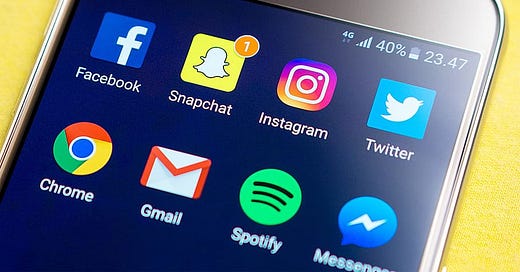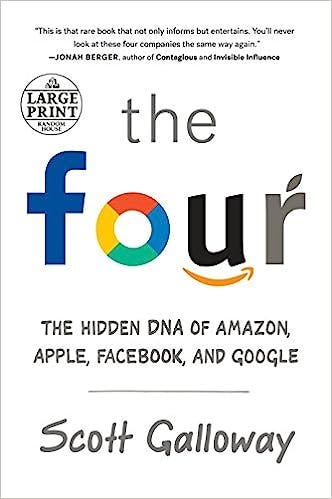Why parents should be very wary of their kids' use of social media—and why I largely abhor it.
The U.S. Surgeon General's advisory on mental health and kids should be priority reading for parents.
When I emcee or speak at events before large groups, the hosts will frequently have me send a list of “did you knows” that can be used during intermission. One of the answers I give always—and I mean always—surprises folks.
Question: “What’s something about you that no one outside your family knows and that people who know you well would be surprised at learning?”
Answer: “ I hate, Hate, HATE social media.”
Invariably, the next question is “But how is that, when I see you active on Facebook and Twitter?” It’s a necessary evil, I say, before adding, that my presence on any social platform is inconsistent at best, and my main reasons for using them at all is for learning (via private groups) and crowdsourcing ideas.
I don’t hate social media for what it is, however; I abhor its use: A time suck that too often stokes our worst sentiments. Additionally, having had two of the major social media platforms as clients in the last five years, I recognize the real value of the platforms is their private groups, not the often-public pages that invite open debate and childish infighting.
Mostly, I hold my nose and reluctantly use social media. (I realize its vast benefits for growing and retaining a brand’s relevance, and for building relationships.)
But for kids, the effects are too often a net negative. For years, researchers, activists and even the very tech employees who helped develop social media platforms have sounded the alarm about the impact of the medium on kids. They pointed to the rise of suicide being in line with the growth of the platforms and link it to the mental health crisis our children now face.
The latest report from the U.S. Surgeon General is enough to get everyone’s attention.
“Nearly every teenager in America uses social media, and yet we do not have enough evidence to conclude that it is sufficiently safe for them,” wrote the surgeon general. “Our children have become unknowing participants in a decades-long experiment. It is critical that independent researchers and technology companies work together to rapidly advance our understanding of the impact of social media on children and adolescents.”
Details of the report:
19 pages in length
More than a decade of research
Assessed the risks posed by social networks
Conclusion: The potential for harm is significant.
Several aspects of the surgeon general’s findings are worth calling out, wrote Casey Newton in his Platformer newsletter.
“One, children are starting to use social media too young. The report found two in five children have begun using social networks between the ages of 8 and 12 — a deeply vulnerable time where it seems unlikely to me that the potential benefits outweigh the risks. And this comes despite the fact that companies’ own terms of service typically forbid children under 13 from using them. Platforms really ought to do more to keep young children off their platforms — and not openly court them with cynical growth-hack products like Messenger Kids from Meta.
“Two, we’re learning a lot about what kinds of children are at higher risk of harm from social networks. It includes adolescent girls; kids with mental health issues; kids who have been cyber-bullied; kids with body image issues and disordered eating; and kids whose sleeping patterns have been disrupted by social media. Parents of children in these categories should pay particularly close attention to their kids’ social media use.”
“Three, there’s growing evidence that frequent social media usage can negatively affect the development of the body. “Small studies have shown that people with frequent and problematic social media use can experience changes in brain structure similar to changes seen in individuals with substance use or gambling addictions,” the report states.”
“Moreover, it noted that “a longitudinal prospective study of adolescents without ADHD symptoms at the beginning of the study found that, over a 2-year follow-up, high-frequency use of digital media, with social media as one of the most common activities, was associated with a modest yet statistically significant increased odds of developing ADHD symptoms.
“Four, a simple intervention that seems to produce significantly positive results is simply to reduce the time children spend using it. Spending more than three hours a day on social networks doubles the risk of bad mental health outcomes, including depression and anxiety. Voluntary screen-time controls don’t seem to be doing enough here; lawmakers should consider creating and enforcing daily time limits for apps like these.”
Author, businessman, and college professor Scott Galloway has long been a vocal critic of social media’s negative impact to our youth, especially young girls.
States are fighting back
In recent years, more than seven states barred public employees from using the app on government devices: Alabama, Maryland, Oklahoma, South Carolina, South Dakota, Utah and Texas. (Another state, Nebraska, banned TikTok from state devices in 2020.) Most recently, Indiana announced two lawsuits against TikTok accusing the Chinese-owned platform of misrepresenting its approach to age-appropriate content and data security.
Utah just passed a law preventing children under 18 from using social networks without their consent.
Arkansas considered something similar.
Montana just banned TikTok altogether.
A silver lining
The news isn’t all bad, especially for historically marginalized groups:
“Social media may support the mental health and well-being of lesbian, gay, bisexual, asexual, transgender, queer, intersex and other youths by enabling peer connection, identity development and management, and social support.”
It also notes that:
“Seven out of ten adolescent girls of color report encountering positive or identity-affirming content related to race across social media platforms. A majority of adolescents report that social media helps them feel more accepted (58%), like they have people who can support them through tough times (67%), like they have a place to show their creative side (71%), and more connected to what’s going on in their friends’ lives (80%).”
Additionally, the authors found research suggesting that social media actually prompts some children with mental health care issues to seek treatment, in part because they’re learning about it there.
A synopsis of the surgeon general’s report
Social media is a powerful tool that can connect people and share information.
However, social media use can also have negative consequences for youth mental health.
Risks of social media for youth
Depression and anxiety: Research has shown that adolescents who spend more than three hours per day on social media are more likely to experience symptoms of depression and anxiety.
Body image: Social media can perpetuate unrealistic body standards, which can lead to body dissatisfaction and eating disorders.
Cyberbullying: Social media can be used to bully and harass others, which can have a devastating impact on victims.
Sleep deprivation: The blue light emitted from screens can interfere with sleep, which can lead to fatigue, irritability, and difficulty concentrating.
Recommendations for mitigating the risks of social media use:
Set limits on social media use: Limit adolescents to two hours per day.
Be mindful of the content you consume: Pay attention to the types of content you are exposed to on social media and be mindful of how it is making you feel.
Take breaks from social media: Take regular breaks from social media to avoid becoming overwhelmed.
Talk to your parents or guardians: If you are struggling with the negative effects of social media, talk to your parents or guardians. They can help you develop strategies for coping with these challenges.
If you’re a parent, you owe it to yourself to read the full report: Social Media and Youth Mental Health.
Recommended…
Interested in doing more reading on the impact of big tech, including the major social platforms? I highly recommend reading Scott Galloway’s book, The Four: The Hidden DNA of Amazon, Apple, Facebook, and Google.





